Say “Short videos are conquering the world”, is there any objection here? App Annie data shows that in 2020 and the first half of 2021, TikTok will rank first among global social apps in terms of downloads. Currently, in the US and UK, the average monthly usage time of TikTok users exceeds that of YouTube.
Seeing that TikTok has taken the attention of young people, Facebook, YouTube, and Snapchat have launched their short video applications, even if they are said to be “plagiarized”, they don’t blush and don’t beat their hearts. The entire Internet is gearing up to stare at this sweet pastry. And the latest to be injected into the “Douyin Paradigm” is the dating app.
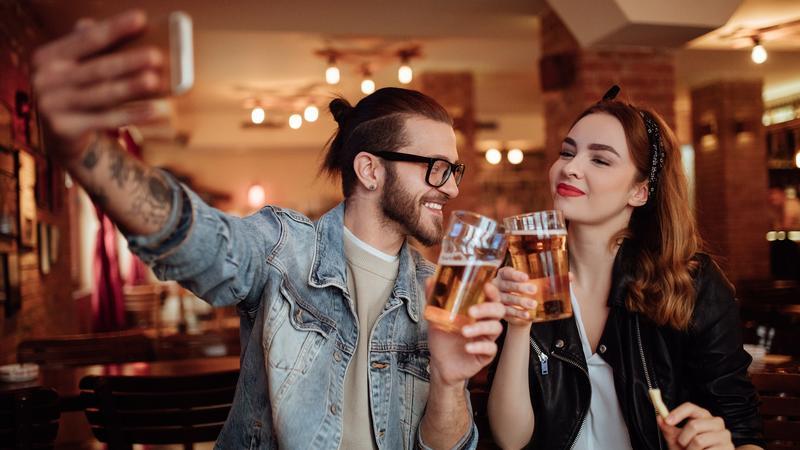
“Old Antiques” only swipe left and right, Gen Z is all swiping
At present, there are at least three combinations of Tinder and Douyin in the overseas dating field: Snack, Lolly, and Feels. Their main interface and interaction are similar to Douyin, but there are some differences.
Snack was officially launched in February this year. In just half a year, it has squeezed into the Top 10 most downloaded dating software in the United States. Snack wants you to show your true self through short videos. You can swipe the content posted by other users in the information flow. If you and a certain lady both “like” each other’s video (click the red heart), the system will open a private message channel for you.
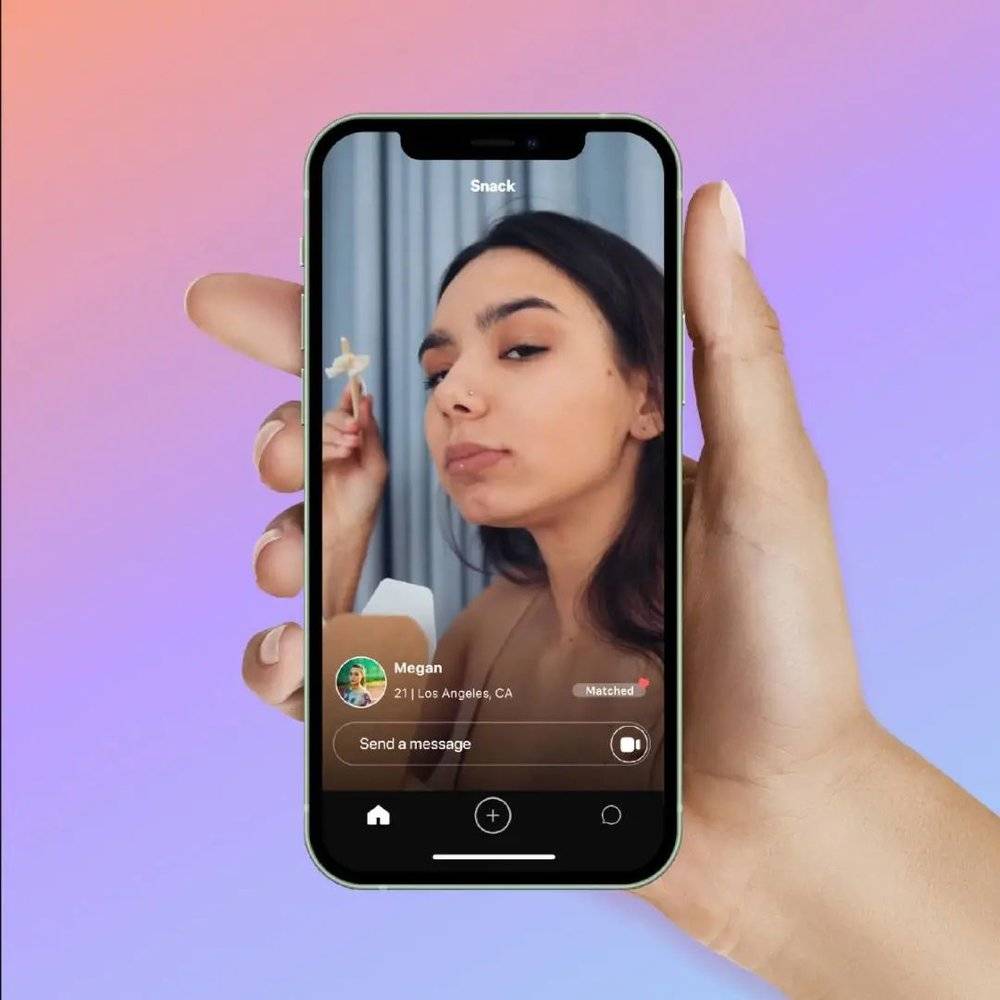
Not only has the same experience been reproduced, but you can also quickly log in to Snack with your TikTok account, and share the videos you posted on TikTok at any time.
Lolly also encourages users to post and watch videos. In the beta version at the beginning of this year, you can “clap” for other people’s videos, or swipe right to hand over your small note, and send a message to the other party to convey “crush”.
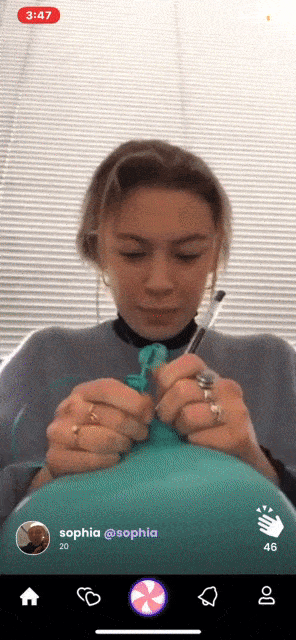
Now Lolly has further simplified the operation: just click on the red heart in the lower right corner of the video to send a crush signal. Waiting for the other party to give your video a red heart, means going in both directions.
Feels, a social product from France currently has more than 300,000 users, and its community atmosphere is more jumpy than Snack and Lolly.
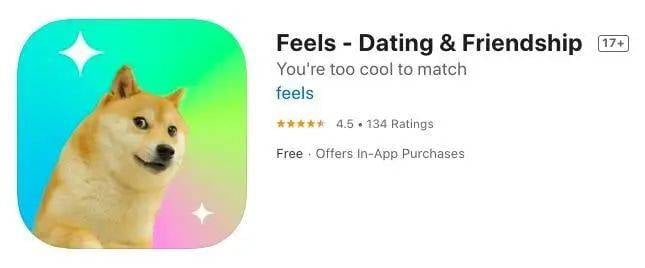
Feels does not position itself as a dating app. It believes that “swiping cards is boring” and “matching is boring”. It hopes to gather a group of cool people to let go of their creativity and imagination to play together. The icon of Feels on the App Store is a cheap dog’s head; its commercial style is also quite playful, and people can’t help but shake their heads and shout “God * sick!”
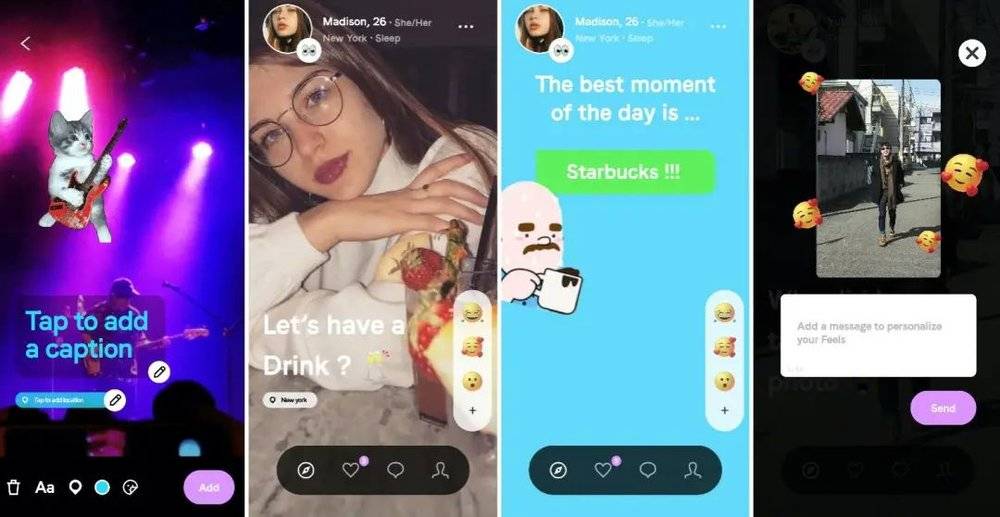
After reading it, I even got a little head over my head
When setting up a personal profile, you can upload videos and photos, and you can also add some Q&As that show your personality. All pictures can be re-created to add copywriting and emoticons. When swiping, click the emoji at the bottom right at any time, and you can send your feelings to the other party.
In multiple media reports, the founders of these three products all pointed out that traditional dating apps such as Tinder can no longer meet the needs of Generation Z. The way of telling stories with pictures is outdated, and video is becoming a new carrier for young people to communicate and express themselves, and it also allows them to show their true selves.
Compared with whether the interaction mechanism is “swipe” or “swipe”, these “industry innovators” seem to pay more attention to how a person is presented on a dating app – not a flat resume-style profile, but a more real living person; Don’t be bored with “Hey what’s up”, every video and whimsy can be your ice-breaking topic.

“Video-centric dating apps are going to be the next wave of dating,” says Snack founder Kimberly Kaplan.
The new generation wants to “kill boredom”, and Tinders are also subverting themselves
Unlike the rhythm of the new generation of apps actively embracing videos, it was not until June this year that Tinder announced that users could upload videos to their files. Although it is boring to be crazily complained about, the old players are quietly “evolving” targeting young people.
To provide a more interesting social experience, Tinder recently launched the “Explore” section. Here, you can find your potential matches through hot topics (Hot Takes), resonance (Vibes), various interest tags (such as rock climbing, skydiving, gourmet), etc. In addition, Tinder also previewed the Swipe Night event in November.
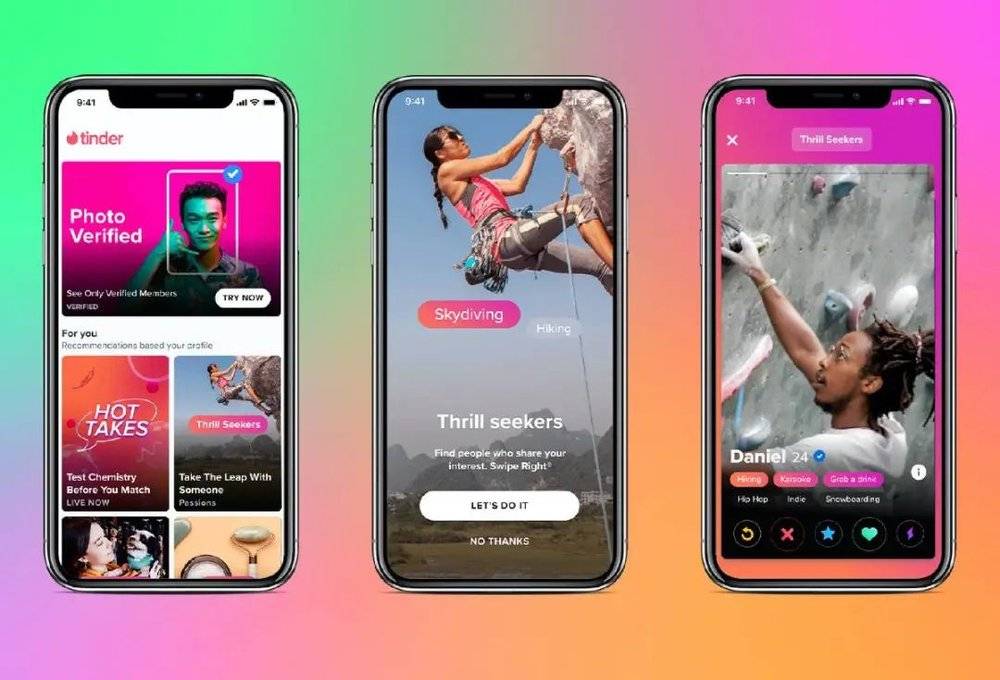
You can think of Swipe Night as a “limited-time carnival party”. Tinder will make a self-made interactive drama, divided into 4 episodes, and one episode will be released every weekend. Users can watch and participate in the interaction on the app.
The first season of Swipe Night started in October 2019. At that time, the plot setting was the end of the world: the earth will be destroyed in 3 hours. How do you choose from a series of emergencies in front of you? Need food or a first aid kit? Want to reach out to a stranger? My friend’s beloved puppy is about to run away, do you want to save it? You can make choices by swiping left and right, just like Netflix’s “Black Mirror: Bandersnatch”, different choices will lead to different plot developments.

After each episode is over, you will enter the quick matching session, and the system will display the choices the other party has made that are consistent with your three views. Swipe left and right to start chatting. It is said that more than 20 million users participated in the first Swipe Night event, resulting in 26% more matches than usual weekends, and Tinder also took home an entertainment award from the 2021 Cannes International Festival of Creativity.
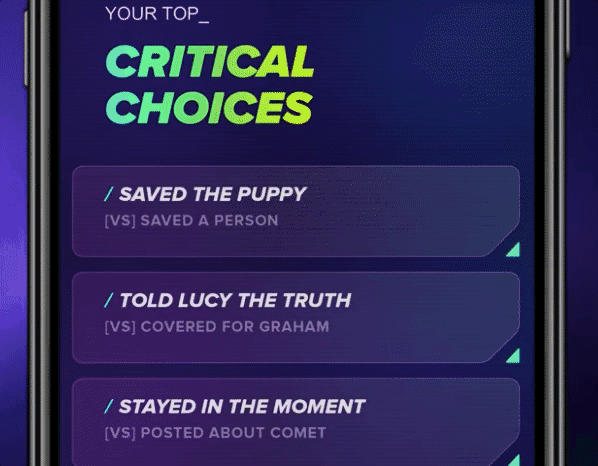
What has changed is not just the boring process of swiping left and right, but also the experience after matching. The role of dating apps in the past is basically over when the matching is completed. Afterward, some people stayed in the ice-breaking session, and some chatted and lost track of what to do next, while friends who had a heated relationship would often turn to acquaintance social platforms to continue chatting or go out on a date directly.
But in the past two years, the epidemic and home isolation have cut off offline romance. Many overseas dating apps such as Bumble, Hinge, and Tinder have successively added voice or video chat functions, setting off a wave of “dating at home”. “Cyber Matchmaker” suddenly finds themselves taking on part of the offline dating scene, and they start worrying about your virtual date after the matchmaking.
Bumble is a female-led dating app. In March this year, it launched a new feature “Night In”. Matching parties can send invitations in advance, agree on a time, and then play games together in video chat, using games to reduce embarrassment.
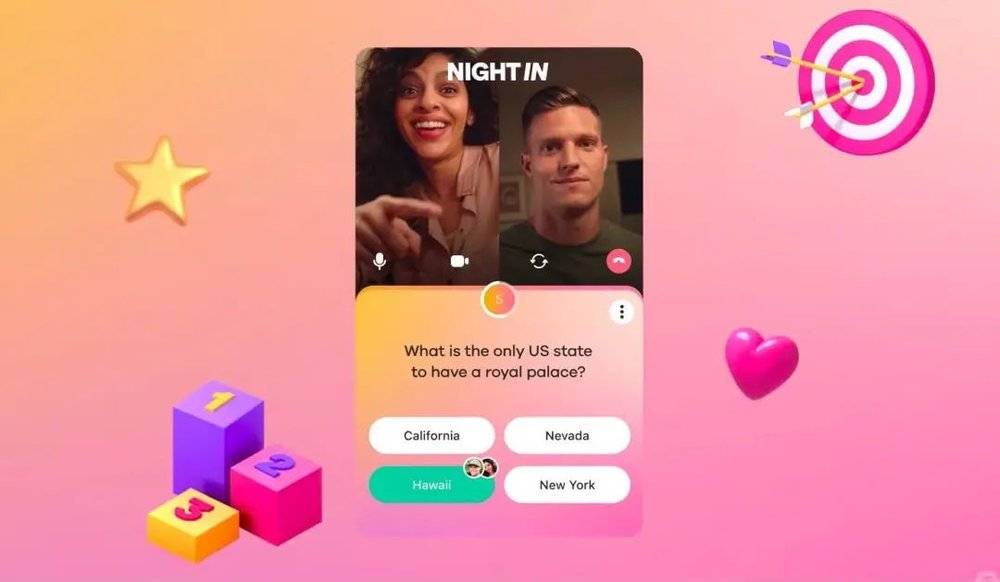
Hinge is owned by the same parent company as Tinder, and the community atmosphere is more geared toward finding serious, long-term relationships. In April, Hinge launched the “Video Prompts” function, which directly hits a bunch of ice-breaking topics on the screens of both parties and teaches you video chatting step by step.
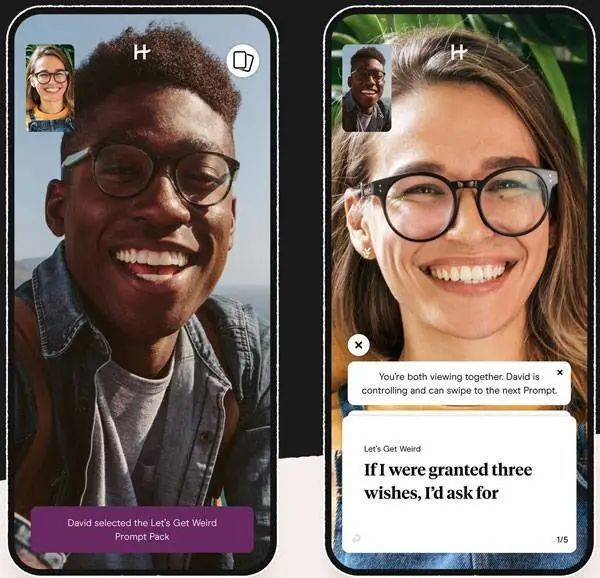
A Tinder research report pointed out that during the epidemic, 50% of Gen Z users have video chatted with their matching partners, and their virtual dating will even extend to other platforms-meet on Tinder, go to the “Animal Crossing Friends Club” game date, turn on the Zoom video and eat takeaway together across the screen. 40% of young users said that even if the epidemic subsides in the future and they can date offline with peace of mind, they are still willing to conduct video chats.
More real, more diverse, more vertical segmentation
Psychology professor Albert Mehrabian once proposed a communication rule: When a person talks about emotions and expresses attitudes, 7% of the receiver’s perception comes from the semantics itself, 38% comes from the tone of voice, and 55% comes from facial expressions.
We all have times when we tapped “Hahahahahahahahahahahahahahahahahahaha” on WeChat, but our faces are indifferent, and voice and video can bring richer information in the scene of dating and making friends, it means more real and lively people and higher matching efficiency.
Dating expert Charly Lester believes that in the future, video is likely to become a powerful reference for people to screen real dating partners, “Compared to wasting two hours in a bar, a video date is easier for you to know if you like each other .”
Of course, melons are not guaranteed to be ripe, and voice and video are not necessarily fidelity. Take the routines of killing pigs and tea sellers as examples. The characters, speech skills, and chemical reactions can be carefully designed. Extras can be hired for photos and videos. The voice changer is becoming more and more realistic. Yin Yeye coaxes you to sleep, you don’t know it, but you still feel sweet in your heart.
Even, Deepfake’s face-changing technology has already entered the live broadcast field, and it is said that there are anchors on platforms such as Twitch and TikTok. How to guard against thieves in the age of Internet love is a subject that requires continuous learning.

A report in The Wall Street Journal pointed out that the dating field is becoming more and more vertical. For example, The League is an elite dating community for singles, Raya is a dating app used by celebrities, you can meet all kinds of beard lovers on Bristlr, and people with a bad digestive system can try to find true love on Gutsy.
The same is true in the country. Some people like to go straight to the present, some prefer to make friends with souls, look at the face with face control, listen to the sound with voice control, and you can even sink and try matchmaking in the live broadcast room…Voice and video may not be your thing, but more and more The more options appear, I hope you can find your comfortable way of dating and making friends.
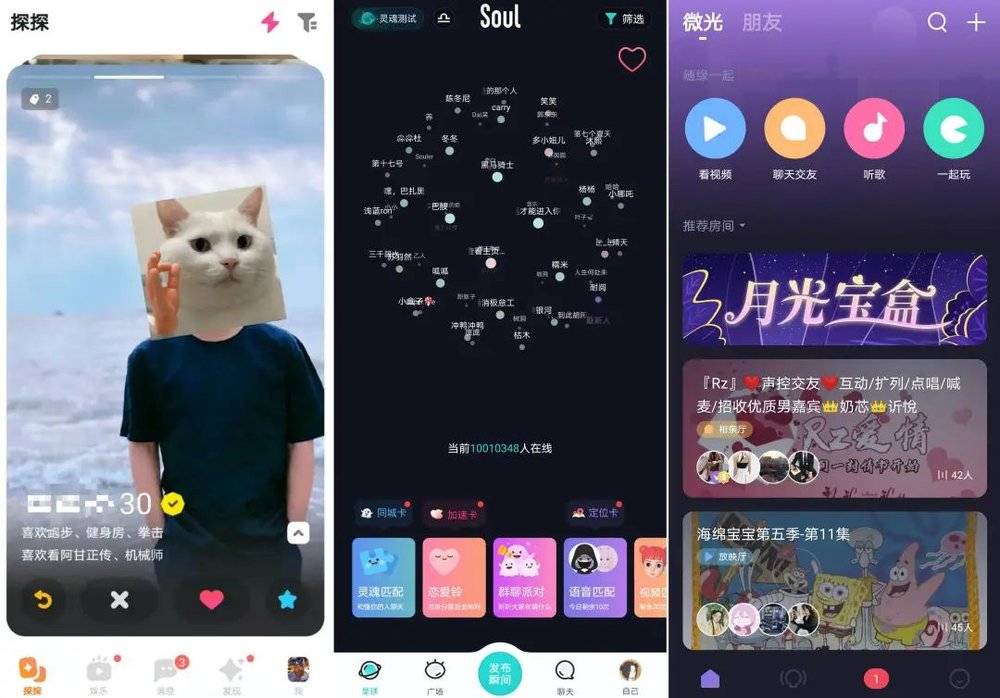
In the future, what kind of surprises will the development of technology bring to this industry?
In May of this year, the Google I/O conference presented the results of the Starline project. Combined with AI, 3D, spatial audio, and other technologies, no AR or VR glasses are required, and the effect of video calls is quite real as if someone is sitting directly opposite you. Will this be the future of virtual dating?

Recently, a sci-fi novel “Adaptability” in Sony’s exhibition “ONE DAY, 2050” also described a possibility: AI will select potential romantic partners for you, calculate the matching degree and arrange a VR date when you are brokenhearted and sad When you are decadent, AI will also arrange psychotherapy to take you out of the haze… Does this one-stop service have a chance to become a reality?
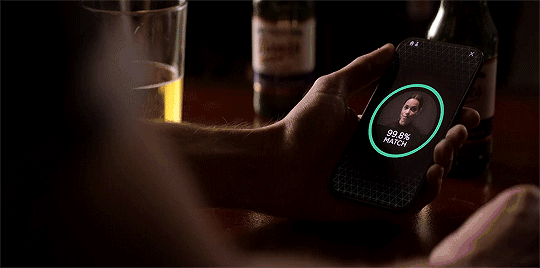
“Black Mirror” S04E04, before you strike up a conversation with the handsome guy in the bar, AI-first simulates and calculates that 998 avatars of you are in love with each other
At this point, the combination of Tinder + Douyin seems a bit dull. So, let’s open our minds and look forward to the next evolution of the “cyber matchmaker”.
